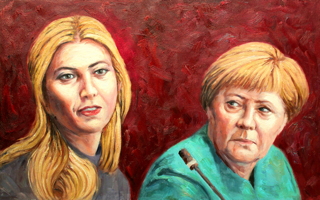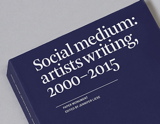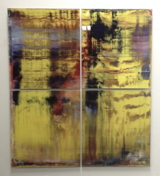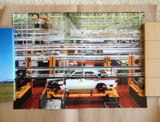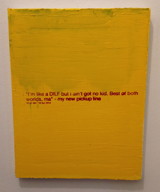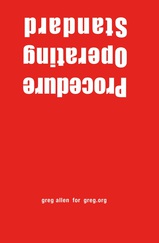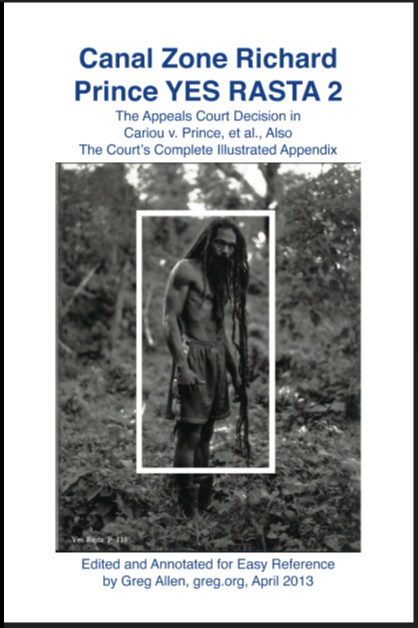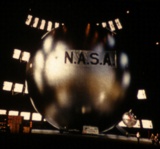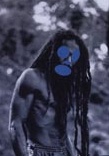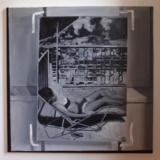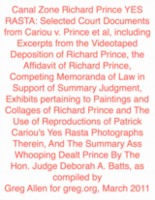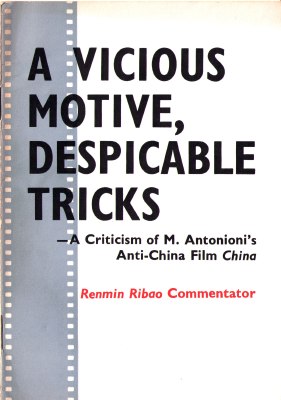
I only discovered the Chinese government's published evisceration of Michelangelo Antonioni's 1972 documentary Chung Kuo - Cina after I thought I'd finished my Cabinet article on Scott Sforza. Jonathan wondered if Susan Sontag's On Photography might have a relevant idea or two in it, so I broke out the old copy--and found Sontag's discussion of Antonioni's "extremely reactionary and despicable"...camera angles [!]. It made for a sweet, surprisingly symmetrical ending to the piece.
Intrigued, I searched around for the full text of the 1974 Renmin Ribao Commentator pamphlet she quoted from, but it wasn't online. So I ended up buying a copy, and scanning it in. It's a fascinating read, and it should have been online long ago.
While the North Korean government is known for bombastic turns of phrase, the Chinese under Madame Mao had a really rousing, articulate, no-holds-barred style of denouncing its enemies and whipping up its populace. Not that the internal political motives of the pamphlet are at all unclear; but it's entertaining. Antonioni's criminal techniques weren't limited to camera placement; his cinematography, use of color and light, editing, and sound editing were all reactionary imperalist tools as well. I don't know if this is where the Dogme folks got it, but the Gang of Four's condemnation of non-diagetic sound is easily as vicious as anything Lars von Trier could come up with, and twice as funny.
Anyway, the entire text is after the jump. The numbers in brackets are the page number/page breaks. If there are any typos or formatting errors, please let me know. Enjoy, comrades!
[begin quote]
A VICIOUS MOTIVE,
DESPICABLE TRICKS
- A Criticism of M. Antonioni's
Anti-China Film China
Renmin Ribao Commentator
FOREIGN LANGUAGES PRESS
PEKING 1974 [page 1]
SINCE the day the five-star red flag was hoisted over Tien An Men Square and
the birth of the new China was proclaimed, different political forces in the
world have assumed different attitudes towards the earth-shaking social
changes in China and the tremendous achievements of her socialist
construction. Hundreds of millions of revolutionary people and friends all
over the world have voiced admiration and sympathy, while a handful of
reactionary forces are filled with great terror and deep hatred. This is
what all great revolutions, whether in China or other lands, in ancient
times or today, invariably meet. The anti-China film China by the Italian
director M. Antonioni, which started showing in some Western countries last
year, reflects the attitude of the tiny handful of imperialists and
social-imperialists in the present-day world who have inveterate hatred for
the new China. The appearance of this film is a serious anti-China event and
a frenzied provocation against the Chinese people.
Antonioni came to China as our guest in the spring of 1972. with his camera,
he visited Peking, Shanghai, Nanking, Soochow and Linhsien County. However,
his purpose in making the visit was not to increase his understanding of
China, still less promote the friendship between the people of China and
Italy. Hostile towards the Chinese people, he took the opportunity of his
visit for unspeakable purposes; by underhand and utterly despicable means he
hunted specifically for material that could be used to slander and attack
China. His three-and-half-hour-long film does not at all reflect the new
things, new spirit and new face of our great motherland, but lumps together
a large number of viciously distorted scenes and shots to attack Chinese
leaders, smear the socialist new China, slander China's Great Proletarian
Cultural Revolution and insult the Chinese people. Any Chinese with any
national pride cannot but be greatly angered on seeing this film. Tolerating
such a film and permitting it to deceive people in various places would be
tantamount to legitimizing reactionary propaganda that wilfully insults the
Chinese people and capitulating to anti-China provocations by the
international reactionaries. In reply to this challenge hurled at the
Chinese people by the international reactionaries, we will thoroughly expose
and criticize this film's counter-[2] revolutionary nature. This is a
serious struggle on the ideological and political front that merits great
attention.
The Italian director claims in his narration, "We do not pretend to explain
China. We only want to begin to observe this great repertoire of faces,
gestures and habits" in China. This is a downright fraud. Every scene in the
"documentary" makes its own explanation. These are scurrilous political
explanations which use reactionary artistry to slander and smear China; they
are outright reckless political attacks on China, on communism and on the
revolution.
It seems quite natural that Tien An Men Square is shown as the film begins.
In fact, this is designed to serve the reactionary theme of the
"documentary." The narrator says: "Peking is the political and revolutionary
centre of China," "the People's Republic was proclaimed here " "and here
passed the waves of Red Guards marching for the Cultural Revolution." Then,
the film leads the spectators away from Tien An Men Square to "observe"
China, supposedly to see what the Chinese revolution has brought the Chinese
people. A series of reactionary scenes follow, distorting the [3] new
China beyond recognition. This structure and composition of the film is
designed solely for the purpose of concentrating its attack on the
revolution led by the Communist Party of China. And here lies the nub of
this film - reviling the revolution, negating it and opposing it.
This reactionary film completely ignores and totally negates the tremendous achievements China has made on all fronts of socialist construction, trying to make people believe that today's socialist new China is not much different from the semi-feudal, semi-colonial old China of the past.
Antonioni presents Shanghai as "an industrialized city," only to sling mud at China's socialist industry. Shutting his eyes to the large numbers of big modern enterprises there, the director concentrated on pasting together a medley of scenes of poorly equipped hand-operated enterprises. Everyone can see the shipyards by the Whangpoo River where 10,000-ton vessels are built and the Chinese-made ocean-going ships that berth in Shanghai. However, before Antonioni's camera, all the freighters on the river are from abroad and China has only small junks. Taking an outright imperialist stand, the director asserts that Shanghai's industry "is not born today" and "as a city, Shanghai was literally built by foreign capital in the last century." "The industries" built [4] after liberation, he declares "are often little better than big handicraft canopies built in a hurry." He says that "the biggest oil refinery in the city is a poor factory practically built with scrap." Isn't that a brazen boast of the ''meritorious service" of imperialist aggression against China in the 19th century and an effort to belittle the great achievements of the Chinese people in developing industry by self-reliance? The director also used very despicable means to take shots that distort the working people. His vicious implication is that if Shanghai, China's major industrial city, is like this, what must other places be like!
Antonioni presents Linhsien County as "China's first socialist mountain " while he actually aims to sling mud at China's socialist country-side. The Red Flag Canal, known in China and abroad, is shown casually in passing and the film presents neither the magnificence of this "man-made river" nor the prosperity in the county following the transformation of its mountains and rivers. Instead, there is a tiresome succession of laboured shots of small plots, lonely old people, exhausted draught animals and dilapidated houses. . . . With great pains he tries to evoke "the poverty of the peasants'' in Linhsien County, describing a mountain village as an "abandoned desolate place" and showing the village school [5] there in most unfavourable light. Antonioni says maliciously that "we would be naive if we think we have discovered a rural 'paradise' " in present-day China. Is this not sheer slander of the Chinese countryside, more than 20 years after liberation, as a hell on earth?
The film vilifies China's socialist construction in a variety of ways, from municipal construction to the people's life, from culture and education to physical culture and sports, from medicine and health to family planning, sparing not even the kindergartens.
In total disregard of the tremendous changes that have taken place in
China's cities, the film depicts Peking as "still an ancient city" with
"very simple and poor" housing and urbanization discouraged. It describes
Soochow as showing "little difference from what it was at the time of its
distant origin " while the changes in Shanghai are presented as limited to
the old houses in the concessions built by ''Western economic empire" turned
into the "office buildings of today."
The film resorts to all possible means to deny the fact that the life of the
Chinese people has improved markedly. It says that "the. inhabitants of
Peking look poor, but not miserable." The director is lenient indeed not to
call the Chinese people miserable. But actually he is mocking at their [6]
"poverty." Did he not work hard in cities and countryside to catch shots to
describe people as "poorly dressed" and doing "hard labour" in order to
spread the false impression that one could meet "poor people" everywhere in
China? He did all this in the manner of an imperialist overlord!
Antonioni describes post-liberation China as all dark, and tries to show
that nothing is in good order and everything is wrong. His purpose is to
make the audience draw the reactionary conclusion that China should not have
made revolution. He attacks the people's communes, saying that they have
gone through "disillusionment." He spreads the lie that the Great
Proletarian Cultural Revolution has ''thrown the system of production into
confusion," and that it has spared "few" of the cultural relics left over
from the past. He even goes so far as to make use of a shot of people doing
the traditional tai chi chuan (shadow
boxing) and lies that "the new leaders" of China want to "abolish" such
''ancient tradition." In a word, in the eyes of this reactionary Antonioni,
China's socialist system is no good, China's revolution is in a mess, and
the only way out is to go back and restore the old order. This shows the
true counter-revolutionary features of Antonioni who poses as a ''Leftist."
[7]
In the film, Antonioni misrepresents the Chinese people and their mental
outlook to an intolerable extent in order to malign the Chinese revolution
and attack China's socialist system. He tries to create the false impression
that the Chinese revolution has neither changed the status of the Chinese
people nor emancipated their minds, and that the Chinese people are not
enthusiastic about the socialist system.
The whole world knows that great changes have taken place in the mental
outlook of the liberated Chinese people. "Do
the Chinese working people still retain any of their past slavish features?
None at all; they have become the masters." In our country,
"never before have the masses of the people
been so inspired, so militant and so daring as at present." However,
Antonioni describes the Chinese people as a mass of stupid, ignorant human
beings who are isolated from the world, who knit their brows in despair and
Listlessness, who are dirty and gluttonous, and who muddle along without any
aim. In order to defame the Chinese people, he racked his brains to present
in a grotesque way various expressions of people sitting in tea-houses and
restaurants, pulling carts and ambling in the streets. He did not even stop
[8] at an old woman's bound feet. Moreover, he disgustingly filmed people
blowing their noses and going to the latrine. In Linhsien County, he barged
into a mountain village and directed his camera at the villagers, who turned
away in protest. He slanders them by alleging that they were "frightened"
and "often petrified and motionless." With "European pride" Antonioni
deliberately sullies the Chinese people. This is a great insult to the
Chinese people who have stood up!
More spiteful is Antonioni's use of devious language and insinuations to
suggest to the audience that the Chinese people are repressed, have no ease
of mind and are dissatisfied with their life. In the scene of the tea-house
in Shanghai's Chenghuangmiao, he inserts an ill-intentioned narration, "It
is a strange atmosphere," "thinking of the past, but loyal to the present."
He uses the phrase "loyal to the present" but means just the opposite.
Actually he is implying that the Chinese people are forced to support the
new society but do not do so sincerely or honestly. Does not Antonioni again
and again suggest that the Chinese people are not free? He openly ridicules
the workers' discussions as "repetitive and monotonous" and "not true
discussion." He slanders Chinese children's singing of "political'' songs
praising Chairman Mao and the Communist Party as doing [9] something
incompatible with their innocence and attractiveness, and as not expressing
their own feelings. He smears the people as being so "prudent and reserved''
that "their sentiments and pain are almost invisible." To him, the Chinese
people are suffering from the tremendous "pain" of dissatisfaction with the
existing order but dare not express it. What nonsense! In our socialist
country of the dictatorship of the proletariat, the people are the masters,
the political situation is lively and vivid, the masses enjoy real democracy
and have boundless ease of mind. Antonioni's attempts to seize opportunities
to fan up dissatisfaction among the Chinese people towards the new China and
the socialist system are futile. Those who do feel ''pain" are the handful
of reactionaries who dream of restoring the dictatorship of the landlords
and comprador-capitalists in China. Saying the Chinese people "think of the
past" is even more slanderous. Who are "thinking of the past"? The Chinese
people deeply hate the "past" when demons and monsters swept over them in a
swirling dance for hundreds of years. It is only the imperialists and their
agents in China who constantly yearn for their lost "paradise" and dream day
and night of turning China back to a semi-feudal and semi-colonial state.
But the wheel of history cannot be [10] turned back, and anyone who attempts
to do so is bound to be crushed by the wheel of history!
The techniques used by Antonioni in making the film are also extremely
reactionary and despicable.
With regard to the selection or cutting of scenes, and how to handle them, he took few or none at all of the good, new and progressive ones, or took some of them as a gesture at the time he was shooting but finally cut them out. On the other hand, he grabbed inferior, old and backward scenes and took as many and as detailed shots of them as possible. Not a single new lathe, tractor, decent-looking school, construction site seething with activity or a rich harvest scene . . . appears in the film. But he took full shots and close-ups of what he considered useful for slandering China and the Chinese people and did not think them tediously long. In photographing the Yangtze River Bridge at Nanking, the camera was intentionally turned on this magnificent modern bridge from very bad angles in order to make it appear crooked and tottering. A shot of trousers hanging on a line to dry below the bridge is inserted as a mockery of the scene. The film gives a still more disgusting [11] presentation of Tien An Men Square. It does not show the panorama of this grand, magnificent Square and takes shots of Tien An Men Gate, which the Chinese people ardently love, in such a way as to strip it of all grandeur. On the other hand, a lot of film is used to photograph crowds in the Square; there are sometimes Long-shots, sometimes close-ups, sometimes from the front and sometimes from behind, at one moment throngs of heads and at another legs and feet moving helter-skelter. These shots are intended to make Tien An Men Square look like a boisterous market-place. Is this not aimed at defaming or great motherland?
In so far as editing is concerned, the film seems to be a jumble of desultory shots pieced together at random, but in fact all are arranged for a vicious purpose. for instance, the director presents the clay sculptures shown in the exhibition hall at the Underground Palace of the Ming Tombs depicting the deep oppression of the working people and how they rose up in resistance during the Ming Dynasty, with narration about the peasants' suffering at that time. This is followed first by a shot of young students with shovels going to the fields to work, and then by a scene in the Sino-Albanian Friendship People's Commune in which a woman commune member is wiping the sweat from her brow--all intended to show that "life in the fields means [12] daily hard labour" and that China's countryside is no "paradise." The director obviously uses these scenes to suggest that the condition of Chinese peasants today is little better than it was in feudal society several hundred years ago. The use of light and colour in the film likewise gives a malicious slant. It is shot mainly in grey, dim light and chilling tones. The Whangpoo River appears as if enveloped in smog. Streets in Peking are done in a dreary monotone. Mountain villages in Linhsien County are hidden in dark shadows. In short, many scenes Rive the audience a forlorn, gloomy, melancholy and sombre impression. Particularly venomous is the use of musical accompaniment to reinforce the aim of vilification. The director did not shoot a single scene of China's model revolutionary theatrical works, but unscrupulously ridiculed arias from these theatrical works. The aria "Raise your head, throw out your chest" sung by Chiang Shui-ying in Song of the Dragon River 1 is used in the film to accompany the scene of a pig shaking its head. This was pure concoction because in fact no such music [13] was being played when the scene was shot, the organization concerned has pointed out. This is a deliberate slander against China's Model revolutionary theatrical works and an attack on China's revolution in art and literature. It is deadly venom to the core!
[footnote on the bottom of p.13: 1 Song of the Dragon River is a modern revolutionary Peking opera which takes its story from China's rural socialist construction. Chiang Shui-ying is the heroine of this opera.]
Antonioni's hostility to the Chinese people is also obvious in the way he
shot his scenes in China. He openly boasts in the film's narration of taking
sneak shots of many scenes in the film, like a spy. He brags about how he
"secretly filmed" a Chinese warship in the Whangpoo "by evading the
restriction'' and how he kept the "cine-camera hidden" to "catch unawares
the daily reality" in Peking's Wangfuching Street. he complains that "it was
difficult to move with a cine-camera" in Chienmen Street. For whom is that
difficult? For a thief. He even asked people to fake a fistfight scene at
the Sino-Albanian Friendship People's Commune in Peking so that he could
shoot the scene to slander the Chinese people. On another occasion he got
people to change clothes to suit his purpose, otherwise he would not take
any pictures. His trickery in taking sneak shots, forcibly taking shots
against people's wishes and fabricating scenes is in itself grave contempt
and disrespect towards the Chinese people.[14]
The appearance of this anti-China film on the international screen is certainly not an accidental, isolated occurrence. It has an international background.
Our situation at home and abroad has improved steadily in recent years. Chairman Mao's revolutionary line in foreign affairs has achieved new and bigger victories. China's international prestige is growing daily. The schemes of imperialism and social-imperialism to isolate and subvert China have gone bankrupt. But our enemies will not accept their defeat in China. Attacking the Chinese revolution and throwing mud at the socialist new China are ways used by them to prepare public opinion for a counter-revolutionary comeback and turning China once again into a colony or semi-colony. It is clear to all that the Soviet revisionist renegade clique is the spearhead and chief boss behind the scenes in international anti-China activities. from Khrushchov to Brezhnev, they all exert themselves to the utmost to smear and assail the Chinese people. They said that the Chinese people were so poor that they drank watery soup out of a common pot and had no trousers to [l5] wear; that the Great Proletarian Cultural Revolution had brought "new destructions" to China's productive forces; that the Chinese people were "worn out" and in "severe trials" "living in barracks,'' etc. But all these stupid slanders only serve to expose the ugly features of the Soviet revisionist renegades, leaving nothing for them to grab at. The Soviet revisionists' anti-China lies have a poor market in the world today. It is precisely in these circumstances that Antonioni's reactionary film, disguised as ''objective" and "truthful,'' is released to deceive people. And, copying a page from the Soviet revisionist slanders and attacks, it attempts to play a role that cannot be played by Soviet revisionist anti-China propaganda itself. In fact, Antonioni has only parroted the bankrupt anti-China propaganda of the Soviet revisionists.
After this anti-China film came out, the American Broadcasting Company (ABC)
bought it for a quarter of a million dollars and put it on show in the
United States. Some persons in America chimed in, describing this
reactionary film as "fascinating." So it seems the ghost of John Foster
Dulles still haunts a bunch of U.S. imperialists, and Antonioni's anti-China
film also serves the needs of these reactionaries.
Although an Italian, Antonioni in no way represents the millions of Italians who are friendly [16] towards the Chinese people. The Italian people will never approve of hostility towards China. By making this anti-China film, Antonioni has obviously gone completely against the wish of the Italian and Chinese peoples to strengthen their friendly relations.
The Chinese people consistently strive to develop friendly contacts and mutual understanding with the people of other countries. In our contacts with others, we never impose our point of view on them. We have repeatedly pointed out that China is still a developing socialist country. Although we have made tremendous achievements in the socialist revolution and construction, we do not try to hide the fact that our country still has shortcomings in its advance and there are still backward and reactionary things; it is necessary to continue the revolution. Chairman Mao frequently reminds us that we must oppose big-power chauvinism. We welcome criticism of our work by friends from other lands. However, we will thoroughly expose anyone who passes himself off as a "friend" but actually engages in shameless anti-China activities to win the approval of imperialism and social-imperialism which are extremely hostile to China, so that he cannot bluff and deceive people. Only by doing so will it be [17] of benefit to mutual understanding and friendly contacts among the people of different countries. This anti-China film by Antonioni reminds us that we should remain sober-minded and never forget there are always forces hostile to the Chinese people in the world and that sharp and complicated struggle continues, although the international and domestic situation is excellent. This reality is independent of man's will. Of course, there is nothing terrifying about attacks on China. All the doughty anti-China warriors, whether important people or otherwise, will only be lifting a rock to drop it on their own feet, no matter what weapon or method they use. The Chinese people will steadfastly and courageously advance along the socialist road. As our great leader Chairman Mao said long ago: "Let the domestic and foreign reactionaries tremble before us! Let them say that we are no good at this and no good at that we, the Chinese people, will steadily reach our goal by our indomitable efforts."
(Renmin Ribao, January 30, 1974) [18]
[end quote]

